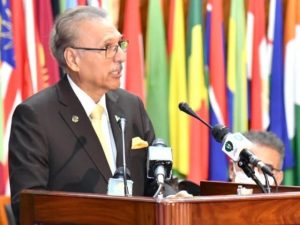Access for the public to bureaucrats is a priority for Alvi.
Participants in the National Management Course are instructed by the President to adopt a discipline that is centred on service.

ISLAMABAD: On Wednesday, President Dr. Arif Alvi issued a call to the nation’s civil workers, urging them to make the bureaucracy into a service-oriented discipline by boosting their efficiency and outreach, particularly to the poor and underserved sections of the country.
Speaking to the attendees of the 117th National Management Course (NMC) at the Aiwan-e-Sadr, he said that the bureaucracy should concentrate on providing relief to the people by removing redundant impediments, which would result in providing hassle-free swift service to the people right at their doorsteps.
Alvi is quoted as saying, “The bureaucracy should focus its energies, abilities, knowledge, and expertise to provide relief to the people of Pakistan by adopting an open-door policy and improving service delivery to all parts, especially to the people of far-flung areas,” in a press release that was issued by the President Secretariat Press Wing. “The bureaucracy should focus its energies, abilities, knowledge, and expertise to provide relief to the people of Pakistan by adopting an open-door policy and improving
“Commitment to the welfare of the people should be the primary pillar of bureaucracy,” he told the course participants, who were senior public servants from a variety of services and professional groups. “Most of the time, it did not require money but a change in attitudes,” he added.
The President of Pakistan emphasised the importance of conducting a review of Pakistan’s bureaucratic procedures with the goal of achieving an exponential improvement in the country’s effectiveness, efficiency, and outcome with the assistance of technologies that are based on artificial intelligence (AI).
During the question-and-answer session, Alvi stated that the bureaucracy was required to provide solutions to problems by identifying them, factoring in successful past experiences, benchmarking the best practises around the world, and setting key performance indicators with a definite timeline for the achievement of targets. Alvi also stated that the bureaucracy was required to provide solutions to problems by identifying them, factoring in successful past experiences, and benchmarking the best practises around the world.
He emphasised that “out-of-the-box ideas and solutions can help better manage the population growth and thus convert them into an economic and financial asset,” despite the fact that “Pakistan is facing population growth,” which is putting tremendous pressure on our limited resources. “Pakistan is facing population growth,” he said.
In response to another question, the President stated that despite the fact that provinces spend more than 20% of their budgets on education, there was still a great deal of room for improvement in both the quality and quantity of educational services.
He emphasised the significance of enrolling more than 20 million children who are not currently enrolled in school and called for the implementation of assistive technology and enabling conditions for more than 20 million people with different types of disabilities in order to provide them with economic autonomy.
The president stated that experience from around the world had shown that hybrid and online education systems were more effective in terms of quality and cost and were playing an important role for students who were unable to acquire an education in-house. He said that this experience had shown that these systems were more effective.
He also emphasised the importance of enhancing the judicial system by reducing the number of cases waiting to be heard and lowering the costs associated with delivering justice. This would “help simplify our operations and bring fast relief to the people,” as he put it.
During this time, the participants of the National Management Course (NMC), as well as the Rector and faculty members of the National School of Public Policy (NSPP), paid a visit to Chief Justice Umar Ata Bandial at the Supreme Court as part of their inland study tour.
The Chief Justice extended a warm welcome to the group and emphasised that the bureaucracy, as the executive cadre of the country, was tasked with the job of executing policies in order to address the complaints of the general public and provide immediate relief to those who were affected.
According to the Chief Justice, delays in decision-making and a reluctance to ensure effective service delivery not only overburdened the judiciary but also added to the despondencies and miseries of the people. This was said to be a result of the judiciary’s unwillingness to ensure effective service delivery.










































